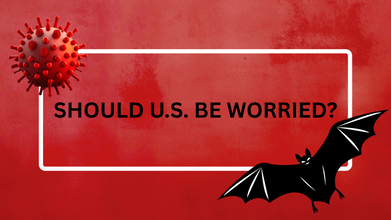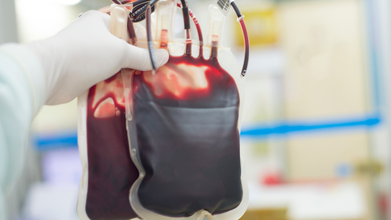- Health Conditions A-Z
- Health & Wellness
- Nutrition
- Fitness
- Health News
- Ayurveda
- Videos
- Medicine A-Z
- Parenting
Japan Races To Develop World’s First Artificial Blood, Trials To Begin

It is no surprise that when anyone looks for innovation and technology, the first name that comes to their mind is of Japan. In yet another breakthrough, Japan may be too close to invent lab. Last year, it was declared that Japan will begin its clinical study of artificial red blood cells that can be stored for transfusion in times of emergency. This was released by Nara Medical University.
It is now in the process of developing artificial blood cells and aims to put these artificial cells into practical use by 2030. This would be world's first.
Also Read: How “Safe” Vaping Is Hooking A New Generation On Nicotine?
Lab-Grown Blood: Why Is This Happening?
Japan is battling a shrinking population, where the older population dominates the younger ones. In 2024, Japan had a record of high 36.25 million people aged 65 or older, representing 29.3% of the total population. This indicates a significantly larger proportion of elderly citizens as compared to the young population.
This has led to a shortage of blood supply, as older people cannot donate blood. As per the Red Cross Society, donors up to 65 years of age can donate blood. While there is no upper age limit, you must be in good health to meet other eligibility criteria.
A 1987 study published in JAMA titled Blood Donation by the Elderly: Clinical and Policy Considerations, notes that it is far more feasible for individuals within the age bracket of 66 to donate blood. Another comparative study from 2019, published in Biomedical Excellence for Safer Transfusion Collaborative (BEST) Investigators noted that while there is no exclusion for older donors, the limit is solely based on their safety.
Also Read: World No Tobacco Day 2025 Theme
Another reason why this clinical study is being conducted is because white blood cells obtained form already donated blood can only be stored for less than a month at low temperatures. However, the artificial cells can be stored for two years at room temperature. As the artificial cells are also made from any blood type, they can be used without confirming a patients' blood type and could be administered even during transportation by ambulance, confirmed the researchers.
The university also said that if no side effects are confirmed with 400ml of administration, the trial will shift to examine the treatment's efficacy and safety.
Who Is Leading This Study?
A team led by Professor Hiromi Sakai of the Nara Medical University is leading this study. The approach involves extracting hemoglobin, which is the oxygen carrying molecule in the red blood cells from expired donor blood, and then encasing it in a protective shell to create stable, virus-free artificial red blood cells.
Also Read: Menstrual Hygiene Importance
How Artificial Blood is Different From Donated Blood?
The main difference lies in the absence of blood type, which further eliminates the need for compatibility testing. This is what makes it invaluable in the case of emergency.
Professor Teruyuki Komatsu of Chuo University is also leading the artificial oxygen carrier study. This uses albumin-encased hemoglobin to stabilize blood pressure and treat conditions like hemorrhage and stroke. For now, animal studies have shown promising results.
How Is Artificial Blood Made?
The process usually starts with stem cells. This is where special cells are that can in fact develop into different types of cell in your body. This includes red blood cells, platelets, or even skin cells.
Scientists use a specific type of cell called the haematopoietic stem cells, which can produce all types of blood cells, including the WBC, RBC, and platelets. They are then placed in a lab setting to turn these stem cells into blood cells.
Cedric Ghevaert, who is the professor of transfusion medicine at the University of Cambridge, explained that scientists are then able to "gene edit" the stem cells to boost blood production and remove blood group markers, as reported in Aljazeera.
Have Others Tried To Make Artificial Blood?
The United States military has invested $46m in developing ErythroMer, a synthetic blood substitute designed to be universally compatible and stable without refrigeration. The product is still under research.
In 2022, a clinical trial in the UK also marked a breakthrough where laboratory-grown red blood cells were transfused into human volunteers to assess their safety standards and longevity, as reports Aljazeera.
In 2013, the U.S. Defense Advanced Research Projects Agency (DARPA) estimated that producing a single unit of lab-grown blood cost over $90,000. Thanks to improvements in production techniques, that cost has now dropped to under $5,000 per unit. In contrast, hospitals in the U.S. paid an average of just $215 per unit for donated red blood cells in 2019.
Budget 2026: Why Cheaper Fish Could Mean a Healthier Brain

Credit: Canva
Finance Minister Nirmala Sitharaman has announced a surprising tax reduction for India's fishers and marine industry, and experts say it is good news for you too.
Until now, fish caught by Indian vessels beyond territorial waters and brought back to the country for mass consumption has been treated as import, attracting customs duties and integrated goods and services tax (GST).
The combined tax burden raises costs and compliance issues, which discouraged people from deep-sea and exclusive economic zone (EEZ) fishing as well as
However, during her Union Budget 2026 presentation, Sitharaman proposed that fish caught in the EEZ and high seas by Indian fishing vessels are treated as duty-free when brought into Indian ports and treated as exports when landed at foreign ports.
This means that the market availability for Omega-3 packed fishes including salmon, mackerel, tuna, herring and sardines will significantly increase as their existing steep prices see a tremendous fall.
What Are Fish Oil Omega-3s?
Omega-3 fatty acids are polyunsaturated fats known for their crucial role in brain function and overall mental health. Fish oil is particularly rich in EPA and DHA, which are vital components of cell membranes and have strong anti-inflammatory effects in the body.
These omega-3s play a critical role in human development, and they are primarily found in fatty fish and fish oil. Since many people do not consume enough fish, supplementation is often recommended to ensure adequate intake of these essential fatty acids.
Although the body can convert another type of omega-3, alpha-linolenic acid (ALA), into EPA and DHA, this process is not highly efficient. As a result, fish oil supplements may provide a convenient way to ensure optimal levels of omega-3s.
READ MORE: NHS Doctor Says This Oil Instead of Cod Liver Is The Best Omega-3 Source
Some popular sources of Omega-3 include:
- Salmon
- Cod Liver Oil
- Algae Oil
- Oysters
- Nuts and seeds, such as flaxseeds, chia seeds, and walnuts
- Plant oils, such as flaxseed oil, soybean oil, and canola oil
- Fortified foods, such as eggs, yogurt, juices, milk, etc.
How Omega-3s Improves Brain Health
EPA and DHA are essential for maintaining brain function throughout life. These fatty acids are abundant in the brain's cell membranes, helping to preserve cell health and facilitate communication between brain cells.
Research has shown that a lack of omega-3 can lead to cognitive impairments. In animal studies, diets deficient in omega-3s resulted in reduced DHA levels in the brain, leading to deficits in learning and memory. In older adults, lower DHA levels have been linked to a smaller brain size, which may indicate accelerated brain ageing.
Maintaining sufficient levels of omega-3s can help support cognitive function and may reduce the risk of age-related brain decline.
The optimal dosage varies, but research suggests that 1,000–2,000 mg of omega-3 fatty acids from fish oil daily is a good starting point. People with depression should look for supplements with higher EPA content. It is pertinent to note that people should consult health experts before starting fish oil supplementation.
Import Duty Decreased On Cancer Drugs
Cancer drugs are medications, including chemotherapy, targeted therapies, and hormone therapies, used to kill cancer cells, slow growth, or relieve symptoms. Some popular medications include Cisplatin, Paclitaxel, Doxorubicin and Pembrolizumab (Keytruda), most of which are imported into India.These imported, specialized cancer treatments, particularly targeted therapies and monoclonal antibodies, often cost thousands, placing a massive financial burden on patients, leading to lifelong debts.
In this year's Union Budget, Sitharaman also proposed reducing import duty tax on 17 cancer drugs and seven medicines for rare diseases, which will in turn, help patients seek proper care on a timely basis.
Deshmukh commented: "India is witnessing a steady and alarming rise in cancer cases, where late detection, prolonged treatment and high medicine costs often lead to preventable complications and loss of life. Against this backdrop, the Union Budget’s decision to remove customs duty on 17 cancer drugs and 7 medicines for rare diseases stands out as a truly progressive and patient-first measure.
"Affordability remains one of the biggest hurdles in cancer care, forcing many families to delay or discontinue treatment. By reducing import duties, this move has the potential to significantly lower the cost of advanced and targeted therapies, making them accessible to a larger section of patients."
Experts Reveal Risks Of Nipah Virus Outbreak In The US, CDC On Alert

Credits: iStock
Experts are cautioning US of a potential Nipah virus outbreak, especially through international travels. Countries across Asia have already started airport health screenings. Thailand has geared up as it receives a high number of travelers from Kolkata, where the two cases of Nipah virus were detected.
Read: Is Thailand Carrying Out COVID 19 Like Screenings At Airports?
Experts Reveal Risks Of Nipah Virus Outbreak: What Are They Saying?
Dr Krutika Kupalli, a Texas-based expert who formerly also worked with the World Health Organization (WHO), told The Daily Mail that the possibility of Nipah virus outbreak is 'absolutely' something the Centers for Disease Control and Prevention (CDC) should be 'closely monitoring'.
“Nipah virus is a high-consequence pathogen, and even small, apparently contained outbreaks warrant careful surveillance, information sharing, and preparedness. Outbreaks like this also underscore the importance of strong relationships with global partners, particularly the WHO, [which] plays a central role in coordinating outbreak response and sharing timely, on-the-ground information," she said.
A CDC spokesperson told The Daily Mail that the agency is in 'close contact' with authorities in India. "CDC is monitoring the situation and stands ready to assist as needed."
Experts Reveal Risks Of Nipah Virus Outbreak: What Is Happening In India?
Nipah virus outbreak reported in West Bengal, India started with the cases of two nurses, one of whom has now been discharged.
As per the World Health Organization (WHO), Nipah virus infection is a zoonotic illness that is transmitted to people from animals, and can also be transmitted through contaminated food or directly from person to person.
In infected people, it causes a range of illnesses from asymptomatic (subclinical) infection to acute respiratory illness and fatal encephalitis. The virus can also cause severe disease in animals such as pigs, resulting in significant economic losses for farmers.
Although Nipah virus has caused only a few known outbreaks in Asia, it infects a wide range of animals and causes severe disease and death in people.
Nipah virus is infectious and can spread from animals like bats and pigs to humans through bodily fluids or contaminated food. It can also pass between people through close contact, especially in caregiving settings. While it can spread via respiratory droplets in enclosed spaces, it is not considered highly airborne and usually requires close, prolonged contact for transmission. Common routes include direct exposure to infected animals or their fluids, consuming contaminated fruits or date palm sap, and contact with bodily fluids such as saliva, urine, or blood from an infected person.
Read: Nipah Virus Outbreak In India: How Did It All Begin?
Experts Reveal Risks Of Nipah Virus Outbreak: What Are The Symptoms
- Fever
- Headache
- Breathing difficulties
- Cough and sore throat
- Diarrhea
- Vomiting
- Muscle pain and severe weakness
Red Cross Faces Blood Shortage, Asks For Immediate Donations

Credits: iStock
The American Red Cross reported a severe shortage of blood that has affected Tri-City area hospitals. In the last month, there has been a 35% drop in blood supply. The 'Code Red' blood shortage in Washington created a critical situation with hospitals requesting for blood. The drop is also noted due to the winter weather that has affected donation drive.
Red Cross Faces Blood Shortage: How Does Weather Influence Blood Bank?
Reports note that during the winter season, blood supply becomes challenging, though its demand may increase due to illness and severe weather conditions. However, the same factors lead to fewer donation drives that leads to critical shortage. According to Red Cross reports, more than 550 blood drives have been canceled since January 21. This has resulted in over 15,000 uncollected blood and platelet donation.
The shortage has severely impacted the availability of blood for trauma victims, cancer patients and those who require emergency surgeries. During such situation, volunteer donors play an essential role.
Diana Heilman, supervisor at the Kennewick Red Cross Fixed Site, said, "octors may face difficult decisions during a blood shortage, such as who can safely receive the products and treatments, and they will potentially have to wait because there simply isn't enough blood available."
Red Cross Faces Blood Shortage: What Is Affected?
- The Kennewick Red Cross identified a dire need of Type O blood, both positive and negative
- A negative
- B negative
- Platelets
Type O is a universal donor, while Type O positive is the most commonly transfused blood type. A negative blood type is found in only 6% of the population, and B negative is less than 2%.
Red Cross also announced a $20 e-gift card for those who donate between January 26 to February 28, as incentive.
Read: Japan Races To Develop World’s First Artificial Blood, Trials To Begin
Red Cross Faces Blood Shortage: Who Can Donate?
Must be in good general health, weigh at least 110 pounds, and be 17 years old (or 16 with parental consent where permitted)
- Valid identification is required, along with a brief health screening before donation
- Minimum hemoglobin levels: 12.5 g/dL for women and 13.0 g/dL for men
- Most medications are allowed, but blood thinners and some antiviral drugs may disqualify donors
- The full donation visit takes about one hour; the actual blood draw lasts 8–10 minutes
- Whole blood can be donated every 56 days; Power Red donations every 112 days
- Platelets are in high demand due to their five-day shelf life and essential role in cancer, trauma, and surgical care
- Donors with O negative, O positive, A negative, and B negative blood types are encouraged to consider Power Red donations
- Officials urge eligible donors to schedule appointments promptly to help address ongoing blood shortages impacting patient care
Red Cross Faces Blood Shortage: Frequently Asked Questions
Read: Thinking of Donating Blood? A Doctor Answers All Your Doubts
Can Women Donate Blood During Their Period?
This is one of the most common concerns, especially among first-time female donors. According to Dr. Sangeeta Pathak, Director and Head of Transfusion Medicine at Max Super Speciality Hospital, Saket, who spoke to Health and Me, as per the Drugs and Cosmetics Act, women are advised not to donate during their menstruation, particularly during the 4-5 days of active bleeding. However, they are completely eligible to donate at any other time of the month if they are in good health.
Can You Donate Blood While Recovering From An Illness?
Health is key when it comes to blood donation. “A person should be completely healthy and free from fever or illness at the time of donation,” says Dr. Pathak. Moreover, certain medications can lead to deferral, and there is a comprehensive list maintained under the Drugs and Cosmetics Act. So if you’re on a prescribed course, it’s best to consult a doctor or the blood bank before donating.
Can You Donate Blood If You Have A Tattoo Or Piercing?
Yes. If you’ve recently had a tattoo or body piercing, you’ll need to wait 12 months before you can donate blood. This is a precautionary step to ensure there’s no risk of transmitting infections.
© 2024 Bennett, Coleman & Company Limited

